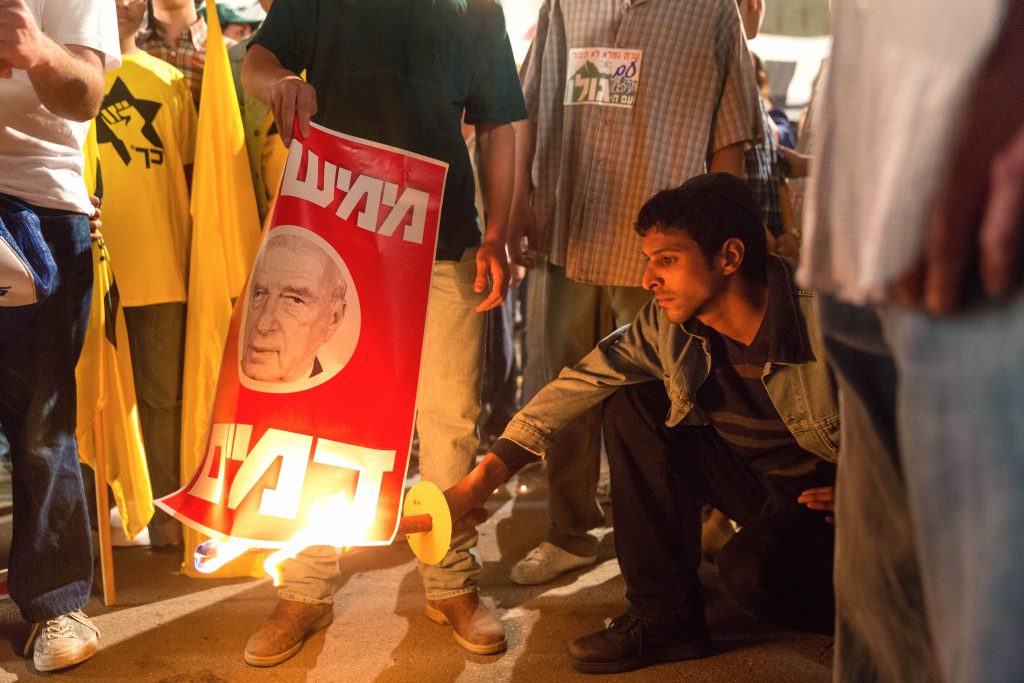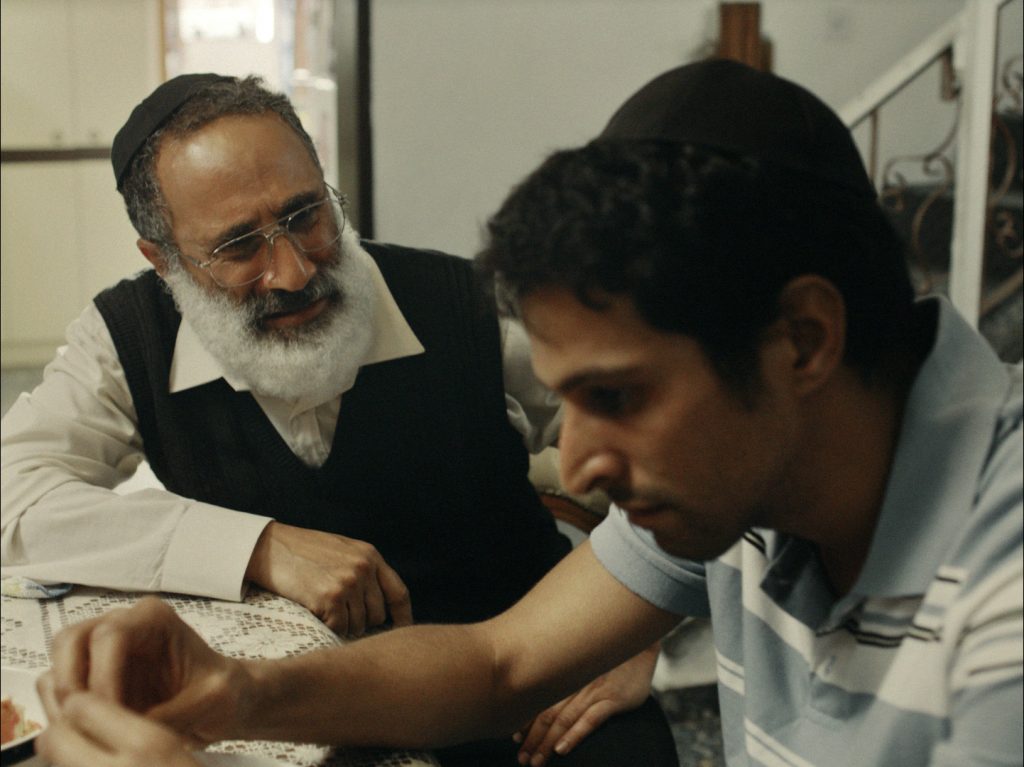AmitayYaish Ben Ousilio, Daniella Kertesz, drama, Incitement, Israel, movies, reviews, Sivan Mast, true crime, Yaron Zilberman, Yehuda Nahari Halevi, Yitzhak Rabin, Yoav Levi
January 30, 2020
by Carla Hay

Directed by Yaron Zilberman
Hebrew with subtitles
Culture Representation: Taking place in Israel, this dramatic film centers mostly on middle-class Israeli residents of different ethnicities and ideological beliefs.
Culture Clash: Depicting the life of Yigal Amir in the year leading up to his 1995 assassination of Israeli Prime Minister Yitzhak Rabin, “Incitement” takes an unflinching look at the political and religious conflicts in Israel over Rabin’s attempts to make peace between Israelis and Palestinians.
Culture Audience: “Incitement” will appeal primarily to those who like arthouse international films about 20th century Israeli history.

Whenever a scripted movie is done from the point of view of someone who murdered a well-known public figure, the filmmakers have to make sure that the killer isn’t glorified. The dramatic film “Incitement—which depicts the life of assassin Yagil Amir in the year leading up to him murdering Israeli Prime Minister Yitzhak Rabin on November 4, 1995—has a tone that is mostly observational, rather than judgmental. The movie is not intended to sway people in one way or the other, politically or religiously. Instead, it is a wake-up call about being more diligent about warning signs that show how someone can turn from being a hate-talking extremist into a murderer.
In the production notes for “Incitement,” director Yaron Zilberman made a statement that included this comment: “At the very beginning of the process I asked myself, together with Ron Leshem with whom I wrote the script, what the most meaningful approach would be for telling the story in order to create a cinematic experience that transmits the magnitude of the catastrophe and from which we could learn the most about how it happened. We concluded that only through an examination of the assassin’s journey could we arrive at new insights.”
“Incitement” immerses viewers on that journey by showing the gradual process of how Amir (played by Yehuda Nahari Halevi) decided to murder Rabin. (The movie also uses a lot of real-life archival news footage.) At first, Amir appears to be an unassuming law student who lives with his parents while attending Bar-Ilan University in Ramat Gan, Israel. In one of the scenes in the beginning of the film, Armir is driving on his way to the university campus, when his car is caught in a big political protest that’s happening in the streets. As the protest becomes violent and he gets out of the car, Amir is nearly arrested because the police think he’s one of the protesters. But he’s able to talk himself out of the arrest by convincing the police officer that he’s just an innocent college student trying to get to one of his classes.
This scene is crucial to understand not only why Amir was able to fly under the radar but also to show how he could mask his dangerous personality under the guise of being a mild-mannered citizen. In the early-to-mid-1990s, Israel was divided over Prime Minister Rabin’s historic attempts to make peace between Israel and Palestine by his push for the Oslo Accords. The Oslo Accords (which included Oslo II) would have granted Palestine temporary self-government rights in certain areas of the West Bank and Gaza Strip, the regions which Israel and Palestine have been feuding over for decades. Israelis with left-leaning political views tended to support the Oslo Accords, while those with right-leaning political views tended to oppose the Oslo Accords.
Soon after viewers see Amir arrive on campus, it’s clear which way he leans politically. He’s shown observing a protest with students, who are dressed as Palestinian Liberation Organization (PLO) officers, depicting what they think would happen if Rabin signs the Oslo II Agreement. The students portraying PLO officers round up other students depicting Israeli citizens, and act out the PLO officers massacring the Israeli citizens. After watching this demonstration, Amir smirks and walks away. His smile indicates that he very much agrees with the beliefs of the students protesting against Rabin’s support of the Oslo Accords.
One of the ways that “Incitement” frames Amir’s increasing obsession with targeting Rabin is by having the TV news playing in the background of many scenes. In each scene where the TV news is on near Amir, he is seen reacting to the political developments of the day that are about Rabin and Oslo II, and his anger toward Rabin grows to dangerous levels. A turning point for Amir is the 1994 Cave of the Patriarchs massacre in Hebron, where an American Israeli named Dr. Baruch Goldstein killed 29 people and wounded 125 others at a mosque. In Amir’s mind, Goldstein is a patriotic and religious hero.
In another scene, Amir attends the public funeral of Baruch Kopel, a relative of Goldstein’s, and later attends a rabbi-led meeting where the rabbi leader praises Goldstein for being a good soldier of the Torah. In real life, after he was arrested, Amir claimed that several Orthodox Jew rabbis endorsed and encouraged him to assassinate Rabin, although no rabbis were ever charged with this crime.
The movie depicts Amir’s claims about the rabbis to be true, as he becomes increasingly angry at Rabin after attending rabbi-led meetings where the rabbis essentially say that Rabin is an enemy of the Jewish religion and should be killed. When Amir tells a leader of these extremist rabbis that he wants to be the one to kill Rabin, the rabbi says he was just joking about killing Rabin, but then essentially tells Amir that if he decides to go through with the murder, he would have no problem with it. We’ll never really know if that exact conversation took place, but “Incitement” makes it clear that Amir would have assassinated Rabin, with or without a rabbi’s blessing.
Throughout the course of the movie, the layers of Amir’s complex life are slowly uncovered. He has a deep infatuation with a fellow law student named Nava (played by Daniella Kertesz) and he pursues her romantically. But there are signs that he has a controlling nature. For their first date, he insists on bringing her home for dinner to meet his parents, who are immigrants from Yemen. But instead of meeting just his parents, Nava finds that several members of his family have gathered, and she’s introduced to them all.
It’s at this family gathering that more details are revealed explaining why Amir turned out the way he did. His domineering mother, Hagai (played by Yoav Levi) is against Rabin’s policies, and she has a great deal of influence on her son, whom she sees as a prince who’s destined for greatness. Amir’s father Shlomo (played by AmitayYaish Ben Ousilio) is a gentle, peace-loving parent who believes in giving Rabin’s policies a chance.
Nava is an Ashkenzai Jew, and Hagai is very prejudiced against Ashkenazi Jews, whom she believes are entitled and uppity. In a private conversation, Hagai tells Shlomo that she thinks that Nava will use and humiliate Yigal, who overhears the conversation and gets upset because he wants to marry Nava. Feeling overwhelmed at this family gathering, Nava cuts the date short before having dinner, by saying she’s stressed out over an upcoming exam and wants to leave so that she can study for it. Although she has doubts about getting involved with Amir and his family, she’s attracted to his charisma and intelligence, so she continues to date him.
It isn’t long before another side to Amir emerges, when he’s seen having secret meetings with shady characters who are hoarding illegal weapons of war. Amir is a military veteran who has kept in touch with several people who have access to these weapons. In one crucial scene in the movie, Amir’s double life is almost exposed when at a family gathering, a fellow military veteran who was in combat with him says that Amir looks innocent on the outside but he’s a ruthless killer when he was in combat. Amir laughs off the comment, but it’s unnerved him because he doesn’t want his family to know about his dark side.
Meanwhile, Amir begins inviting students and other young people to what he has described as religious retreats. But, as he admits privately to certain people, these retreats are really just a way for him to recruit people for a radical militia that he wants to lead. “Incitement” shows how the retreats start off as road trips by bus to various religious and historical sites in Israel, but then the retreats become cult-like gatherings where the members get worked up over talking about how Rabin’s government is trying to destroy the Jewish religion.
When Amir meets Nava’s family for the first time, he makes his political views clear, by saying that he has no problem with Arabs but he has a problem with Jewish “traitors from within.” Nava becomes increasingly uncomfortable with Amir’s extreme views and his ambitions to lead a militia, and she breaks up with him. He eventually moves on to another attractive female law student: Margalit Har Shefi (played by Sivan Mast), who shares his radical beliefs and plays a pivotal role in what would become his plans to assassinate Rabin.
Through researching ancient Jewish scripture, Amir has fixated on the idea that Jews who betray other Jews are enemy informers of the religion, and that it is within a religious Jew’s right to kill those informers. As he says in a well-received speech during one of his radical retreats, Jewish law is above worldly law. And as far as Amir is concerned, Rabin is the biggest Jewish informer traitor of them all.
Amir reaches a point when he doesn’t even try to hide from his family how much he hates Rabin. While sitting at a table and watching the news with his father Shlomo one day, Amir says that Rabin “should be taken out.” Shlomo gets very upset, and during their argument, the father tells his son that the military has changed his personality for the worse. And with other people, Amir essentially comes right out and says that he wants to kill Rabin. Just as it is with many people who commit first-degree murder, all the warning signs were there, but nothing was really done to prevent the murder from happening.
In his portrayal of Amir, actor Halevi does a masterful job of embodying Amir’s dual personas as a charming student and as a cold-blooded killer. The movie leaves it open to interpretation for viewers to decide if Amir was a true sociopath or a religious fanatic who thought that committing this assassination was a noble thing for his religion. The movie works very well in other areas—such as direction, cinematography screenwriting and editing—but what makes “Incitement” the most compelling is Halevi’s performance. It’s no wonder that “Incitement” won Best Film at Awards of the Israeli Film Academy—the Israeli equivalent of the Oscars. Regardless of people’s political and religious beliefs, watching “Incitement” will leave viewers with the haunting reminder that there are no real winners in this tragic story.
Greenwich Entertainment will release “Incitement” in New York City on January 31, 2020. The movie’s U.S. release expands to Los Angeles and other cities, beginning February 7, 2020. “Incitement” was originally released in Israel in 2019.
